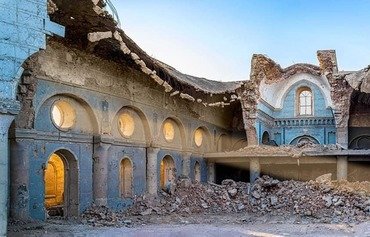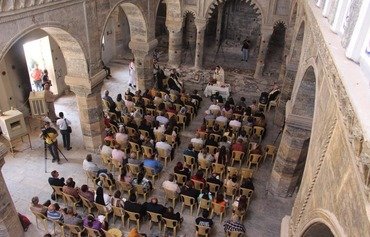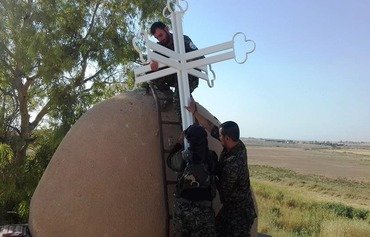Iraqi Christians recently paid a visit to the Anbar districts of al-Khalidiya and al-Habbaniya to pray in three churches that had fallen into disrepair.
Local residents and officials, including many Muslims, in January joined Chaldean Catholics for prayers at the Anbar province churches of St. Korkis, St. Saoua and the Church of the Virgin Mary.
The occasion was the first of its kind since the defeat of the "Islamic State of Iraq and Syria" (ISIS), and drew a number of Christian families from Baghdad, as well as representatives from the Iraqi Council of Churches.
"Al-Khalidiya district has witnessed the first [Chaldean] Catholic mass and celebration," municipal council head Ali Daoud told Diyaruna.
![Christian families gather at the Church of St. Saoua during a recent return visit. [Photo courtesy of al-Shabab Radio station in Ramadi]](/cnmi_di/images/2019/02/06/16508-church-anbar-600_384.jpg)
Christian families gather at the Church of St. Saoua during a recent return visit. [Photo courtesy of al-Shabab Radio station in Ramadi]
Christian visitors from other Iraqi cities were warmly welcomed by local residents and government officials, who took part in the prayer service, he said.
Members of the visiting delegation "were overjoyed with the event", Daoud added, pointing out that the occasion demonstrates that "Iraq remains united and its people embrace and accept each other".
Al-Khalidiya district's al-Sissi neighbourhood "is a microcosm of Iraq, where you can find churches alongside Shia and Sunni mosques", he said, adding that for decades "everyone has been peacefully co-existing".
Restored stability in Anbar has made it possible for all religious groups and sects to once again hold public celebrations.
"After liberation from the terrorist gangs of ISIS, the people of Anbar are now able to enjoy security, stability and reconstruction," said al-Khalidiya district council security committee chairman Ibrahim al-Fahdawi.
The conduct of the Chaldean mass and the ability of Christian families to roam freely through the streets of al-Khalidiya and al-Habbaniya "proves that there is security and stability, and Anbar is back to normalcy", he told Diyaruna.
Plans for rehabilitation, return
"Churches in al-Sissi are among the most important religious sites that the local population has managed to preserve," al-Fahdawi said.
Efforts are under way to rehabilitate and repair these sites, he added, since they carry historical significance for all the people of Anbar.
Until many were forced into exile by ISIS, Christian families lived peacefully for years among Sunni, Shia and Kurdish families, said Sheikh Mahmoud al-Khlefawi, a leading tribal figure in al-Sissi.
"Christians would go about their lives in a normal fashion for years, with al-Habbaniya being home to Christian athletes and poets," he told Diyaruna, singling out the poet Sargon Boulous as an "innovative literary giant".
"Most Christian families, including mine, lived in al-Sissi," said Saifan Matti, a member of the visiting Christian delegation who now lives in Erbil.
"I recognise our neighbours like Um Mohammed, who owns the old sweets shop, and our neighbour Hajj Sattar," Matti told Diyaruna.
"The streets of al-Sissi are etched in my memory, and this is what prompted us to visit our families in Anbar," he said, adding that now he has been back, he plans to visit more frequently.

![A member of the visiting Christian delegation lights a candle at the Church of St. Korkis in Anbar. [Photo courtesy of al-Shabab Radio station in Ramadi]](/cnmi_di/images/2019/02/06/16468-file-600_384.jpg)
![A Christian girl opens the doors of the Virgin Mary Church in Anbar. [Photo courtesy of al-Shabab Radio station in Ramadi]](/cnmi_di/images/2019/02/06/16466-Virgin-Mary-church-600_384.jpg)
![Chaldean Christians return to pray at Anbar churches from Baghdad and other Iraqi cities. [Photo courtesy of al-Shabab Radio station in Ramadi]](/cnmi_di/images/2019/02/06/16472-Chaldean-Christians-Iraq-600_384.jpg)
![Christian families returned in January to visit the Church of St. Saoua and other Anbar churches. [Photo courtesy of al-Shabab Radio station in Ramadi]](/cnmi_di/images/2019/02/06/16461-St-Saoua-church-600_384.jpg)
![Christian families gather at the Church of St. Saoua during a recent return visit. [Photo courtesy of al-Shabab Radio station in Ramadi]](/cnmi_di/images/2019/02/06/16460-Christian-families-church-600_384.jpg)






